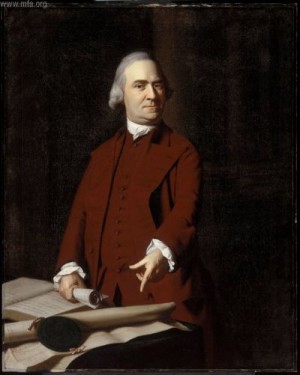“BOSTON, Aug. 15, 1774.
Dear Sir, – Our public affairs have not changed their appearance since your departure. The people are in high spirits, and have the greatest confidence in the wisdom and spirit of the congress, whose decisions they seem determined to abide by. Mr. Gage sent, the day before yesterday, for the selectmen, and informed them, that he had received an act of parliament prohibiting their calling town-meetings without a license from him. They told him, that they should obey the laws of the land; and that they had had two adjournments of their meeting, and knew of no occasion to call another. He replied, that “he would endeavor to put the act in execution; and, if any ill consequences followed, they only were blamable. As to their adjournment, he must consider of it; for by such means they might keep their meeting alive these ten years.” Upon this, they left him. On Friday, agreeable to a request from the other towns in this county, the selectmen and committee of correspondence met, and chose five members to attend the county congress at Stoughton tomorrow: Joseph Warren, William Phillips, Esq., Mr. Oliver Wendell, Dr. Benjamin Church, Mr. John Pitts. Mr. Phillips has refused. We shall elect a member to fill his place.
General [Charles] Lee leaves us today. Enclosed you have a hint which I think very important; but it ought to come from a member for some other colony: nay, if it was done wholly by the other members of the congress, I should like it better, as, it will perhaps be injurious to you to come into such resolutions. With respect to some who are sworn in as members [of Governor General Thomas Gage’s Mandamus Council], the poor fellows hang their heads already. Some spirited resolutions of the congress will drive them to despair. The gentlemen from the Royal Governments may possibly think, that, although our council is appointed by mandamus, we are, nevertheless, upon as good a foundation, in that respect, as themselves. But they will consider, that it is not simply the appointment of the council by the king that we complain of; it is the breach thereby made in our charter: and, if we suffer this, none of our charter-rights are worth naming; the charters of all the colonies are no more than blank paper. The same power that can take away our right of electing councillors by our representatives can take away from the other colonies the right of choosing even representatives; and the bill for regulating the Government of Canada shows plainly that it would be very pleasing to the ministry to deprive the Americans totally of the right of representation; and, indeed, by the Acts of the British parliament, and by the instructions given to governors, they are already deprived of all the advantages derived from representation. A fair state of this matter, done by the masterly hand of some of our worthy friends at the congress, would open the eyes of many. I am sure the congress will be able to convince the world, that the present American representation is a shadow, and not a substance; and I am certain, that, unless it is put upon a better footing, the people themselves will, in a few years, readily consent to throw off the useless burthen. But I am perhaps too much like the declaimer who delivered a lecture upon the art of war to the illustrious general Hannibal.
Mrs. Adams and your family are well. The doctor [Samuel’s son Dr. Samuel Adams, Jr., recently Dr. Warren’s apprentice in medicine] and she set out for the Eastern country to-day. Mrs. Cushing and family are in good health. Mr. Adams’s friends in town are well, as I heard his lady was last Saturday. Please to present my very respectful regards to your three brethren, and believe me to be your fast friend and H. servt.
Jos. Warren
P.S. – While writing, Mr. Pitts comes in, and informs me that Dr. Williamson has written to his friend in Philadelphia; assuring him that the ministry have lately written instructions to General Gage not to take one step against the Americans, if the opposition to ministerial measures should be general.
The celebrated Colonel [Israel] Putnam is now in my house, having arrived, since I subscribed this letter, with a generous donation of sheep.”
Source: Samuel Adams Papers 1635-1826. In Wells and Bancroft Collection. New York: New York Public Library. Transcription appears in Richard Frothingham, Life and Times of Joseph Warren, Boston: Little Brown & Co. 1865, pp. 339-340.
Commentary: In August of 1774 Joseph Warren coordinated closely with Samuel Adams, who was on his way to the First Continental Congress in Philadelphia. The Massachusetts congressional delegation then out of the province, Warren remained as the senior Patriot on the scene in Massachusetts. By design necessitated by lag-time inherent in two-way communication at a distance, Warren exercised considerable autonomy during an unstable time. The Suffolk County Convention, to which Warren was an elected representative of Boston, had not yet met. Warren fanned efforts to shame the Mandamus Councilors and to render Gage’s appointees ineffective. He hosted Charles Lee and Israel Putnam, whose visits to Boston may have included discussions behind closed doors concerning Patriot military organization and options. Warren appears to lobby Samuel Adams on behalf of Charles Lee, should the Continental Congress make military appointments.

 Follow
Follow